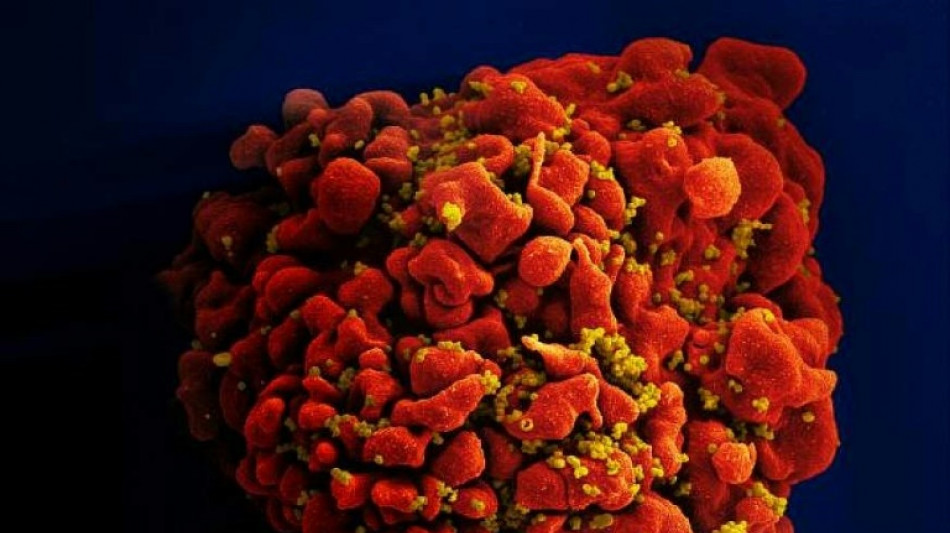
-
 EV sales hit record in UK but still behind target
EV sales hit record in UK but still behind target
-
AI expected to star at CES gadget extravaganza

-
 Brazil says 2024 was its hottest year on record
Brazil says 2024 was its hottest year on record
-
Soldier in Vegas Tesla blast suffered PTSD, no 'terror' link: FBI

-
 Microsoft expects to spend $80 bn on AI this fiscal year
Microsoft expects to spend $80 bn on AI this fiscal year
-
Man arrested for supplying drugs to Liam Payne: Argentine police

-
 Breeding success: London zoo counts its animals one-by-one
Breeding success: London zoo counts its animals one-by-one
-
Biden blocks US Steel sale to Japan's Nippon Steel

-
 Wall Street stocks bounce higher, Europe retreats
Wall Street stocks bounce higher, Europe retreats
-
Neil Young says he will play Glastonbury after all

-
 Biden blocks US-Japan steel deal
Biden blocks US-Japan steel deal
-
British novelist David Lodge dies aged 89

-
 Indonesia says 2024 was hottest year on record
Indonesia says 2024 was hottest year on record
-
Indian duo self-immolate in Bhopal waste protest

-
 Indian food delivery app rolls out ambulance service
Indian food delivery app rolls out ambulance service
-
European stock markets retreat after positive start to year

-
 UK electricity cleanest on record in 2024: study
UK electricity cleanest on record in 2024: study
-
Biden to block US-Japan steel deal: US media

-
 Thai PM declares millions in watches and bags among $400 mn assets
Thai PM declares millions in watches and bags among $400 mn assets
-
China says 'determined' to open up to world in 2025

-
 Asian shares rise defying slow Wall Street start to 2025
Asian shares rise defying slow Wall Street start to 2025
-
'Emilia Perez' heads into Golden Globes as strong favorite

-
 'You need to be happy': graffiti encourages Cuban self-reflection
'You need to be happy': graffiti encourages Cuban self-reflection
-
Disaster-hit Chilean park sows seeds of fire resistance

-
 Mixed day for global stocks as dollar pushes higher
Mixed day for global stocks as dollar pushes higher
-
Nick Clegg leaves Meta global policy team

-
 Tesla reports lower 2024 auto deliveries, missing forecast
Tesla reports lower 2024 auto deliveries, missing forecast
-
Meghan Markle's lifestyle show to premiere Jan 15 on Netflix

-
 Wall Street lifts spirits after Asia starts year in red
Wall Street lifts spirits after Asia starts year in red
-
UK's biggest dinosaur footprint site uncovered

-
 Most UK doctors suffer from 'compassion fatigue': poll
Most UK doctors suffer from 'compassion fatigue': poll
-
Secret lab developing UK's first quantum clock: defence ministry

-
 US mulls new restrictions on Chinese drones
US mulls new restrictions on Chinese drones
-
Wall Street dons early green after Asia starts year in red

-
 Stock markets begin new year with losses
Stock markets begin new year with losses
-
Sales surge in 2024 for Chinese EV giant BYD

-
 Asian stocks begin year on cautious note
Asian stocks begin year on cautious note
-
Blooming hard: Taiwan's persimmon growers struggle

-
 Asia stocks begin year on cautious note
Asia stocks begin year on cautious note
-
Cosmetic surgery aficionado Jocelyne Wildenstein dies aged 79: partner

-
 Power restored to most of Puerto Rico: utility
Power restored to most of Puerto Rico: utility
-
Tintin, Popeye, Hemingway among US copyrights expiring in 2025

-
 Finnish police probing seven sailors over cut cables
Finnish police probing seven sailors over cut cables
-
End of Russian gas via Ukraine sparks unease in eastern Europe

-
 Island-wide blackout hits Puerto Rico on New Year's Eve
Island-wide blackout hits Puerto Rico on New Year's Eve
-
Musk flummoxes internet with 'Kekius Maximus' persona

-
 US stocks slip as European markets ring out year with gains
US stocks slip as European markets ring out year with gains
-
Syria's de facto leader meets minority Christians

-
 Panama marks canal handover anniversary in shadow of Trump threat
Panama marks canal handover anniversary in shadow of Trump threat
-
US, European stock markets look to ring out year with gains


New 'highly virulent' HIV strain discovered in the Netherlands
Oxford researchers announced Thursday the discovery of a highly virulent strain of HIV that has been lurking in the Netherlands for decades, but because of the effectiveness of modern treatments, is "no cause for alarm."
Their analysis, published Thursday in the journal "Science," showed that patients infected with what they call the "VB variant" had 3.5 to 5.5 times higher levels of the virus in their blood than those infected with other variants, as well as a more rapidly fading immune system.
However, the study also found that after starting treatment, individuals with the VB variant had similar immune system recovery and survival to individuals with other HIV variants.
"There's no cause for alarm with this new viral variant," said Oxford epidemiologist Chris Wymant, the lead author on the paper, in an interview with AFP.
The variant likely arose in the late 1980s and early 1990s in the Netherlands, according to the researchers, but began to decline around 2010.
Since modern interventions still seem to work on the variant, the research team believes that widespread HIV treatment in the Netherlands did not contribute to the virus's evolution, and that early detection and treatment are paramount.
"Our findings emphasize the importance of World Health Organization guidance that individuals at risk of acquiring HIV have access to regular testing to allow early diagnosis, followed by immediate treatment," said co-author Christophe Fraser, also an Oxford researcher, in a press release announcing the findings.
The work also supports the theory that viruses can evolve to become more virulent, a widely-hypothesized idea for which few real-world examples have been found.
The Delta variant of the novel coronavirus was another recent example.
The discovery of the HIV variant should therefore "be a warning that we should never be overconfident about saying viruses will just evolve to become milder," said Wymant to AFP.
In total, the team found 109 people infected with the VB variant, with only four living outside the Netherlands, but still in western Europe.
- 500 mutations -
The HIV virus is constantly evolving, so much so that each person infected has a slightly different version.
The VB variant, however, was found to have over 500 mutations.
"Finding a new variant is normal, but finding a new variant with unusual properties is not -- especially one with increased virulence," Wyman explained.
The research team first identified the VB variant in 17 HIV positive individuals by parsing a broad data set from the BEEHIVE project, a data collection and analysis initiative in Europe and Uganda.
Because 15 of the 17 were from the Netherlands, they further studied data from 6,700 HIV-positive Dutch individuals, identifying 92 others.
The earliest appearance of the VB variant in their data was found in someone diagnosed in 1992 who had an early version of the variant, and the most recent in 2014.
Other researchers have since found other individuals with the variant diagnosed after 2014.
Doctors usually measure HIV's deterioration of the immune system by monitoring the decline of CD4 T-cells, which are targeted by the HIV virus and pivotal for protecting the body against infections.
In patients infected with the VB variant, CD4 decline occurred twice as fast compared to other variants, "placing them at risk of developing AIDS much more rapidly," the researchers said.
In addition to its increased impact on the immune system, the team also found the VB variant to be more highly transmissible.
They came to that conclusion after comparing the different versions of the VB variant drawn from infected patients.
The fact that they were so similar suggests that the virus passed rapidly to someone else before it could accumulate many mutations.
- 'Critical' to diagnose and treat early -
"Because the VB variant causes a more rapid decline in immune system strength, this makes it critical that individuals are diagnosed early and start treatment as soon as possible," the press statement noted.
"This limits the amount of time HIV can damage an individual's immune system and jeopardize their health," added Fraser.
Fraser is also the principal investigator of the BEEHIVE project, which was launched in 2014 to gather data on how mutations in the HIV virus can lead to varying degrees of severity among patients.
Those differences have previously been thought to mostly relate to the strength of individuals' own immune systems.
The researchers said they could not identify which genetic mutation in the VB variant caused its virulence, but they hope future studies will be able to.
Y.Ibrahim--CPN
